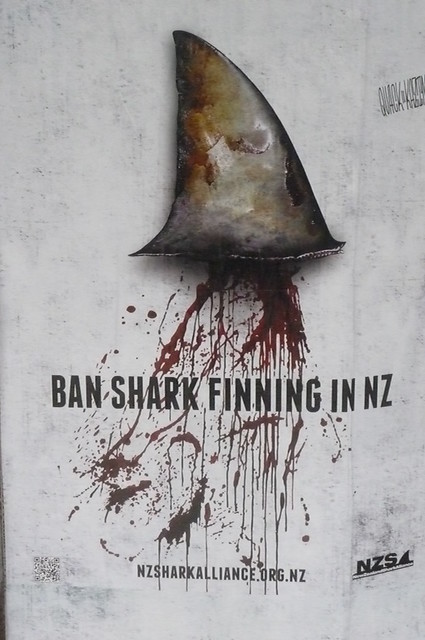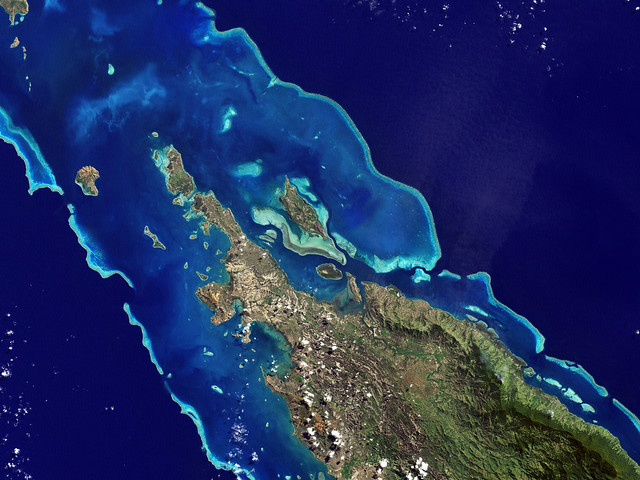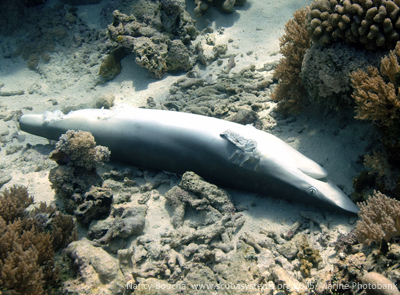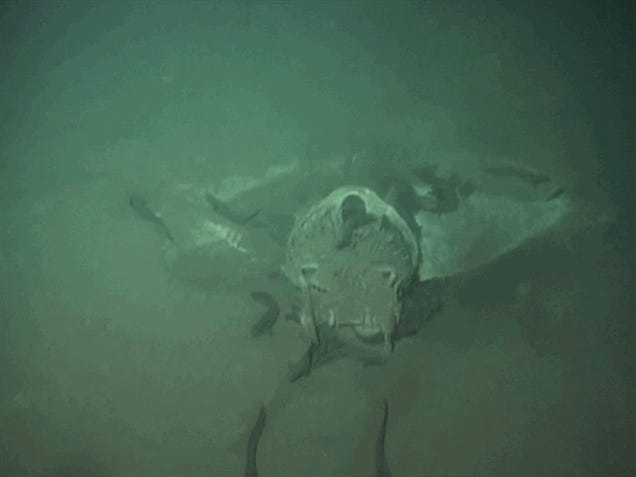- Elimination of Shark Finning in NZ
- New Hope for a Thriving Ocean Economy In New Caledonia
- UK Urged to Champion Deep-Sea Conservation in Northeast Atlantic
- International Coastal Cleanup Collects 12 Million Pounds of Trash
- Changing Attitudes in China Towards Animal Welfare
- Robot Finds a Rare Fish Graveyard
1. Elimination of Shark Finning in NZ
The New Zealand Government is proposing a total ban on the finning of dead sharks in response to widespread public concern about the gruesome practice. Finning of live sharks was outlawed in New Zealand in 2009, but it was still legal to remove the fins from dead sharks and throw away the carcass - though the entire weight of the shark was still included in a fishing boat's quota. The new regime requires fishing companies to release sharks alive or bring them ashore with fins attached for processing.
New Zealand is among the world's top 20 exports of shark fins, most of which are sent to Asia to be made into a popular delicacy or traditional medicines. But public discontent about the fishing method has continued to grow, and some businesses such as Air New Zealand have responded by refusing to transport shark fin exports.Between 50,000 and 150,000 blue sharks were believed to be killed in New Zealand waters every year, many of them as by-catch in tuna long-lines. Only a handful of New Zealand restaurants continue to sell shark-fin soup.
2. New Hope for a Thriving Ocean Economy in New Caledonia
The new law brings under careful management a multi-use, marine protected area which totals a massive 1.3 million km2, making it the largest protected area in the world. Essential to people, biodiversity and climate resilience, the park's ecosystems generate around 2,500-3,000 tons of fish each year, providing food to New Caledonia's quarter of a million people and an economic driver for the territory's sustainable economy.
Located 2,000 miles east of Australia in the Pacific Ocean, the Natural Park of the Coral Sea covers all of New Caledonia's Exclusive Economic Zone (EEZ), or, the marine waters extending 12 to 200 nautical miles from its coasts. According to the International Union for the Conservation of Nature (IUCN), the park is home to more than 4500 km2 of fishery-supporting coral reefs, the deepest site in France (7919m. deep), 25 species of marine mammals, 48 shark species, 19 species of nesting birds and five species of marine turtles.
New Caledonia itself is the world's only stand-alone Biodiversity Hotspot, and a French overseas territory, which is highly dependent on its natural capital. Its coastal waters boast the world's largest lagoon, which has earned UNESCO World Heritage Site status.
In the next phase of the park's development, the levels of protection will be defined. Ultimately, the Natural Park of the Coral Sea will be a multiple use area with various zones for economic activity and conservation.
3. UK Urged to Champion Deep-sea Conservation in Northeast Atlantic
Numerous scientific reports published by the International Council for the Exploration of the Sea, the European Union’s Hermione Project, the UN Environment Programme and others have highlighted the destructive nature of bottom trawling to slow growing, low-productivity deep-sea fish species and deep-sea ecosystems such as cold-water coral reefs, sponge fields, and other deep-sea habitats found along the continental slope and on seamounts in the Northeast Atlantic.
The Deep Sea Conservation Coalition has called on the UK government to lead the effort at European Council to phase-out deep-sea bottom trawling in the Northeast Atlantic to protect the biologically rich areas of the deep-sea in European waters.
4. International Coastal Cleanup Collects 12 million Pounds of Trash
This new total is an indicator of the tremendous amount of ocean trash found on shorelines and in the ocean and waterways around the globe. "Ocean trash truly is a global problem that affects human health and safety, endangers marine wildlife, and costs states and nations countless millions in wasted resources and lost revenue," said Andreas Merkl, Ocean Conservancy's president and CEO.
At its core, however, ocean trash is not an ocean problem; it is a people problem – perpetuated by the often unwitting practices that industry and people have adopted over time. Additional information about items found, infographics, and state-specific data are available online at www.oceanconservancy.org.
5. Changing Attitudes in China Towards Animal Welfare
Since the adoption of President Xi Jinping’s austerity policy, shark fin consumption in the last Chinese New Year has dropped significantly. A wider animal protection movement is also gathering momentum and is challenging patterns of eating that are promoted by business interests.
Now you can get 10 years in the slammer for buying or selling 420 different endangered land and aquatic species for food. So order carefully ... because pangolins, golden monkeys, moon bears, tigers, rhinos, lots of turtles, and some species of sharks are all technically off limits.
Development in China is increasingly seen not just in economic terms, but in an appreciation for quality of life and a desire for the government to take a moral lead. Wildlife protection is a crucial component of this. As a rising superpower, the Chinese government’s actions for wildlife protection will not only enhance its legitimacy domestically, but internationally too.
6. Robot Finds a Rare Fish Graveyard
It's an unusual find because little is known about the fate of vertebrates below 600 feet. Dr. Nick Higgs, from the University of Plymouth's Marine Institute, explained that "There's been lots of research on whale-falls, but we've never really found any of these other large marine animals on the sea bed."
The graveyard included a whale shark and three mobulid rays. It covers one square half mile of the sea floor, and the animals had been deceased for one to two months when found. Large animal carcasses like this make up four percent of the food source for their environment (which explains why the fish were guarding the bodies so closely.)
Original Articles
http://www.nzherald.co.nz/nz/news/article.cfm?c_id=1&objectid=11259762
http://www.thewire.com/technology/2014/05/oil-seeking-robot-finds-fish-graveyard-instead/371024
http://www.digitaljournal.com/pr/1932623
http://www.thefishsite.com/fishnews/23234/uk-urged-to-champion-deepsea-conservation-in-northeast-atlantic
http://www.dailymail.co.uk/tvshowbiz/article-2631123/Miranda-Cosgrove-stunning-grey-patterned-dress-Nautica-beach-bash.html
http://phys.org/wire-news/162112259/in-new-caledonia-new-hope-for-a-thriving-ocean-economy.html
http://theconversation.com/china-clamps-down-on-bear-farms-and-shark-fins-as-animal-welfare-attitudes-shift-26936


























